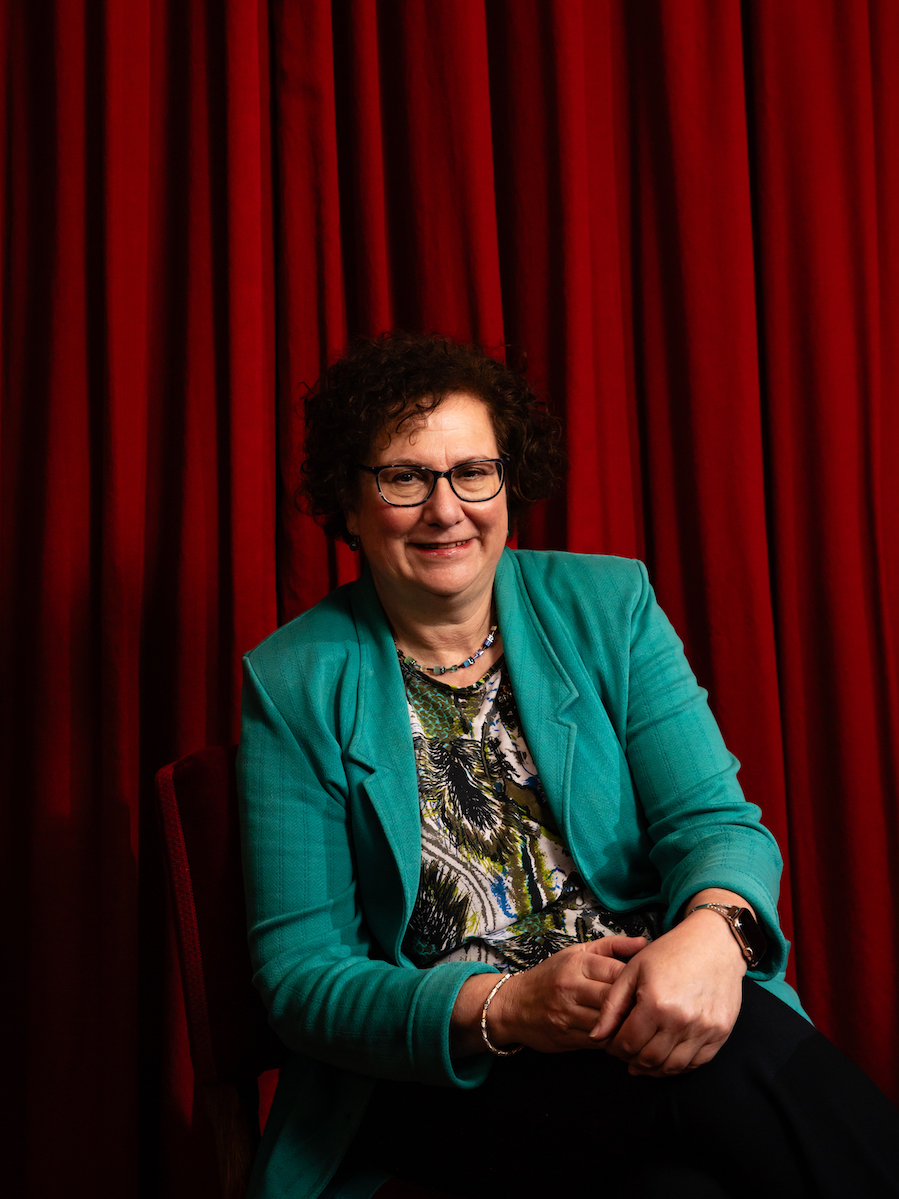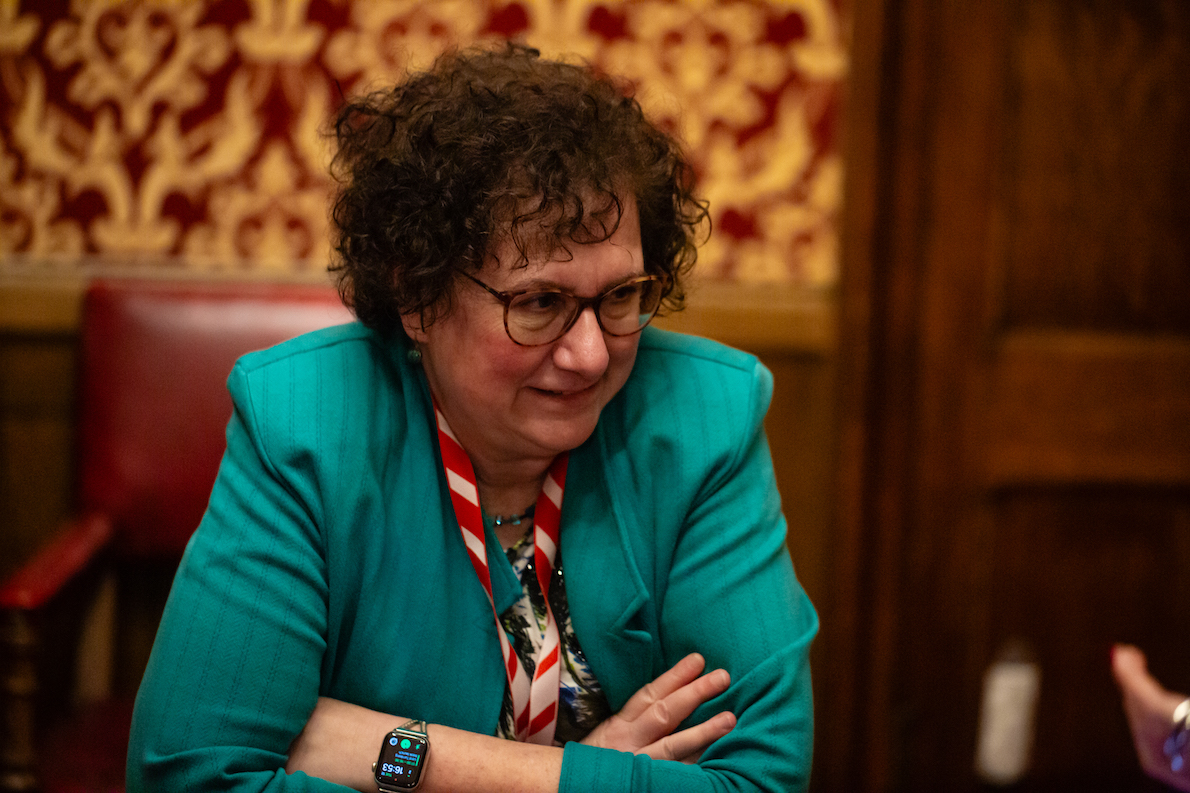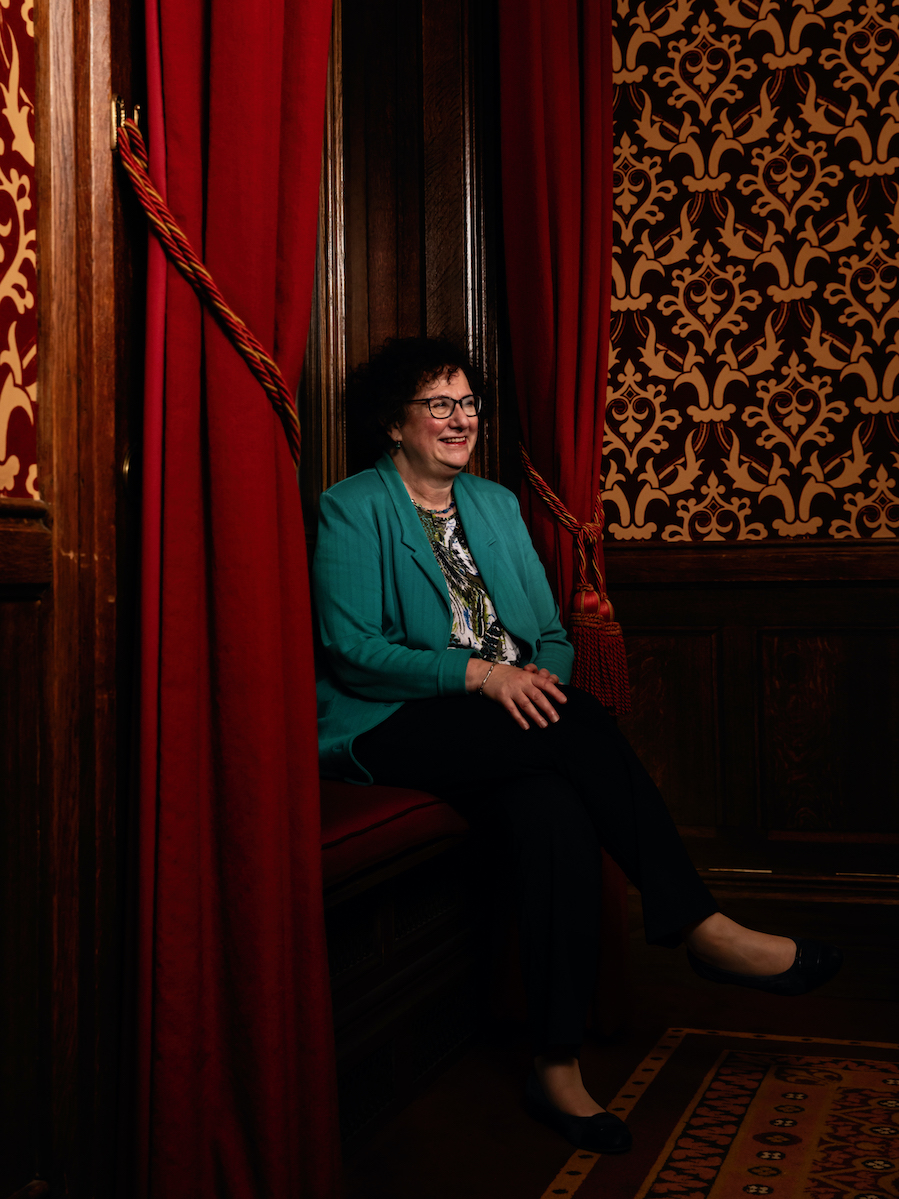Baroness Cass: 'I don't have time for keyboard warriors in their basements'
13 min read
The Cass Review into NHS gender services for children opened up the national conversation on this controversial subject, and divided opinion. Its author, Baroness Cass, speaks to Tali Fraser about being newly introduced as a peer and how she responds to critics. Photography by Louise Haywood-Schiefer
Baroness Cass of Barnet is lost. She’s only just been introduced as a peer and, without her own office, can’t find the room booked for an interview with The House. At one point in the search, we startle builders on a break in their rest room.
“I spend quite a lot of time lost,” Cass admits when at last we find the allotted space. “I’ve got the distinction of being able to get lost in my own toilet without a satellite navigation system, so you can imagine here I’m doomed. But, anyway, I’m just beginning to get a bit of a handle on it.”
Joining the House of Lords crossbenches, she was appointed in Rishi Sunak’s dissolution honours list for her work as a paediatrician and leading the Cass Review into NHS gender identity services for children, the largest ever conducted, reviewing data from 113,000 children.
She chose Baroness Hollins and Baroness Neuberger to introduce her as a peer in October. “My background is in paediatric disability, and Baroness Hollins is a really strong disability campaigner,” Cass says, adding of Baroness Neuberger: “I’m Jewish and I did feel I wanted a Jewish peer… If you are swearing a serious oath in a place that takes faith seriously, having one of my faith leaders in the form of a rabbi on hand was quite a good thing to do.”
She went for the Barnet title, partly because her home area already had a famous baroness in Margaret Thatcher of Finchley.
“I grew up in Finchley, but Finchley is associated with another Baroness. My parents lived in Finchley, with my mum having been from quite a working-class background but ended up as a Thatcher-voting Tory because she was like working-class made good. My father was Welsh and a leftie voter, so they decided not to go out to vote because they cancelled each other out.”
I always said it was a mistake allowing the review to get named eponymously
Dr Cass is still working part-time for NHS England, supporting the implementation of recommendations from her review, but has ringfenced Tuesdays for time in the Lords: “I was slightly stressed about the fact that I thought I couldn’t be here enough, but Black Rod was incredibly helpful and said, just don’t stress about it, because this place has been here for quite a long time and it will be here for a bit longer.”
The introduction itself, she says, “was a lovely day”, with her team from the Cass Review coming along for tea and repairing to the pub.
“It was very special, because the review team, whose names stay out of the limelight, were absolutely crucial to the work and are the unsung heroes behind all of this, so it was great to be able to have them there.”
Taking four years on the 388-page report, informed by meetings with more than 1,000 people, seven new evidence reviews, and a survey of 15 gender clinics across Europe, it produced 32 recommendations. The Cass Review already notches up 129 mentions in Hansard. “I always said it was a mistake allowing it to get named eponymously,” she jokes.
 “One of the Greek psychologists who works in the area said that he’d gone on holiday to an obscure Greek island with a couple of hundred people on it – there’s maybe one or two kids on the island who are gender-questioning – and someone came up to him and said: ‘Have you heard about this Cass Review?’ He contacted me and said: ‘I cannot get away from you, even on this tiny island!’”
“One of the Greek psychologists who works in the area said that he’d gone on holiday to an obscure Greek island with a couple of hundred people on it – there’s maybe one or two kids on the island who are gender-questioning – and someone came up to him and said: ‘Have you heard about this Cass Review?’ He contacted me and said: ‘I cannot get away from you, even on this tiny island!’”
Her report certainly put her in the spotlight. Receiving aggressive emails, Cass was advised to stop using public transport because of security concerns. “The people who sit in basements, who are keyboard warriors, who want to say things that are abusive, are much less important than the people I can actually have a proper dialogue with,” she says.
One of those Cass was able to have a proper dialogue with was Labour MP Dawn Butler, who repeated claims in the Commons that Cass had not included 100 transgender studies in the review but later withdrew her comments after a conversation with the expert.
“Dawn Butler rang me after she made the original statement,” Cass says. “We had a very long chat about it so when she retracted, it was on the basis of us having a really helpful conversation.”
Disagreement, the new peer argues, is healthy, but it is the misinformation that truly riles her: “The thing I find frustrating is when people spread deliberate disinformation, or people who haven’t read the report and make assumptions about what it said.”
The British Medical Association (BMA) fell well short in its response in her view. The BMA initially decided to lobby against the Cass Review, without consulting its 195,000 members. The BMA Council cited among its sources a 39-page document published by the Integrity Project, an organisation based at Yale Law School, titled An evidence-based critique of the Cass Review. It claimed Cass’ work had “serious methodological flaws”.
But in an article published in the Archives of Disease in Childhood, a peer-reviewed British medical journal, a group of leading paediatricians identified a series of unfounded claims, misrepresentations and factual errors in the US paper. The BMA’s critique “was full of disinformation”, Cass claims. “They had cited a blog on the Yale website that’s not even supported by the University of Yale.”
The BMA was eventually forced into taking a ‘neutral’ stance on the Cass Review, a partial climbdown, after first calling for a pause in implementing its recommendations.
“[The BMA] didn’t say what they wanted paused. Were they objecting to more centres being available? Were they objecting to more research? Were they objecting to better training? They didn’t say what they were actually objecting to.”
The BMA has said it hopes to have completed its full evaluation responding to the Cass Review by the end of the year, but so far Cass hasn’t heard anything: “I wait with interest.”
A spokesperson for the BMA tells The House that it set up a “Task and Finish Group” in July to complete the evaluation, which will “utilise the expertise... that has been the cornerstone of the association since its inception in 1832”. They add: “We are... prioritising the needs of trans children and young people, who deserve the very best care, as we have in many previous discussions with both NHS England and the Department of Health and Social Care.”
Even during Brexit, you could get people from opposite ends of the debate in a room together
Cass says “the most important thing” she is in discussions about, including with NHS England, is around public information: “We need a much, much broader, proactive communication strategy and public health approach so that everybody knows the facts because otherwise the disinformation still fills the space.
“We need a trusted, NHS-blessed source of information for parents and young people, and we need broader education for primary and secondary care teams to know what the facts are, what they should be doing, their responsibilities. Because if everyone’s not on the same page of understanding, what’s happening is that children end up in specialist centres without even giving them the best information. Then the only information they get is off the internet, which says the only thing that’s going to help them is hormones, and that clearly may not be the case.”
She praises the “vast majority of politicians” on their handling of the review as, “for the most part, it was not about politicising it” – and was relieved that both major political parties, Labour and the Conservatives, publicly supported the review, which Cass argues has proven “hugely important in partly dialling down the rhetoric”.
The Lib Dems are yet to make a formal statement on the Cass Review. “No,” she says, with a somewhat defeated look, “they haven’t yet. We are hoping to get to meet them because, as luck would have it, we were due to speak to them the very afternoon that Rishi Sunak called the election, so we’re hoping to remedy that as soon as possible. It is important that we have dialogue with them.”

The proactive dialogue, Cass says, should be around “how do we protect everybody’s rights and safety?”. It means she has little patience for questions like ‘does a woman have a penis?’. “What does the journalist hope to achieve when they ask that question?” she asks. “It’s a really unhelpful, reductive way of dealing with things, and that’s not addressing the issues... It just typifies what goes on in this debate of people wanting to make it polarised.”
Cass was “pleased” that Health Secretary Wes Streeting “was decisive” on extending the puberty blockers ban but recognises that, with the time limit on the temporary curbs, “he had to do something”. She doesn’t know what his final decision will be.
Responding to the argument that the ban is driving the use of puberty blockers underground, she says: “You can never completely eliminate harmful substances, whether it’s ecstasy or whatever, but I still think that there is a responsibility on government to try and reduce the extent to which young people are exposed to medicines or drugs that may be harmful. And the real key, the real prize here, is getting faster access to services, even local services.”
She believes one of the best things to come out of her review is the ability to have open conversations about gender and “answer the questions that maybe people have been afraid to ask in other settings”.
“The most challenging thing about this is people feeling that they can’t just ask what they want to ask. They can’t talk about it. If you talk about it, somebody says, ‘Well, you’re transphobic’. In medicine, if you have a topic that you can’t discuss, that’s really risky for the patients and for the clinical study.”
How can you call somebody who’s trans a Terf? It just goes to show how ridiculous it is
The term ‘Terf’, meaning trans-exclusionary radical feminist, is often bandied around during discourse on gender. It is a term Cass has heard often, and one she thinks poses a problem. “Once you resort to name-calling, that immediately cuts across having a reasoned debate,” she says, leaning forward. “I’ll tell you the craziest thing I heard.” Here Cass recounts an anecdote in the United States surrounding psychologist Erica Anderson, whom she calls “an unbelievably brave trans woman”.
“Anderson worked for a long time in gender medicine for children. At one point, she became worried, concerned about some of the same issues I flagged in my report and said, ‘We need to be much more cautious and thoughtful about this.’ She’s been called a Terf. Well, how can you call somebody who’s trans a Terf? It just goes to show how ridiculous it is… It is meaningless.”
She is relieved that the level of discourse has not been “like it has been in the States” and that “children weren’t used as a kind of tennis ball in the election”. But the health professional recognises “it is a very emotive subject” and had a discussion with think tank More in Common about just why it proves to be “such a divisive and emotive issue”.
“Even during Brexit, you could get people from opposite ends of the debate in a room together. But even though we did massive engagement through the review, people with quite strong views on either side, you could not get them together… People on either end of the debate, we didn’t even attempt to get in a room together because that was clearly just not going to work.”
She recognises that, fundamentally, her review “doesn’t have all the answers”, but hopes it addresses the immediate concerns of gender-questioning young people. “There are long waiting lists. Kids are very distressed, and rightly so,” she says. “For completely inadvertent reasons, these young people have been kind of orphaned by the system… The bulk of the recommendations are aimed at making this just like normal care.”
Would banning conversion therapy now make that easier? It could remove the fear clinicians have of seeing such cases for being accused of conducting conversion therapy. “The problem is, nobody’s been really clear about defining what they mean by conversion therapy,” Cass replies. “There are individuals who are saying that [psychological] therapists who just take that careful, exploratory approach with a young person are conversion therapists, and that’s why it becomes so difficult, because then those therapists working in that space who are getting attacked become fearful,” she adds, making pains to say she does not want to pre-empt any legislation.
Cass says professional support should be offered to help come to terms with “difficult and complex” social transitioning. “In an ideal world, you want to get help from a professional for the family as soon as possible to just support them through the decision making,” she adds. “Things are always better when parents are involved in any major decision for a young person, and it’s really difficult in a family where there are secrets and very difficult for a young person if they are assuming one identity at home, another identity at school… It is always ideal that parents should be involved in these decisions. In paediatrics, we operate on the presumption that parents are well-intentioned towards their children, unless you’ve got reason to feel that there may be safeguarding issues.”
The problem Cass has in the Lords is refining her interests across health, the children’s agenda and disability rights. She is keen not to get ‘typecast’, she says. “It would be ridiculous not to contribute [on gender], but equally, I do want to establish early on that I’m not a one-trick pony.”
She gave her maiden speech during a debate on smartphones in schools and says: “We’ve got to find better ways of protecting children and young people.” The challenge is figuring out the right path, and she is looking to see what happens in Australia, where a bill has been introduced to ban under-16s from social media. “But I think we’ve just got to be really creative and think about multimodal ways,” Cass adds. “Many schools are doing the right thing and have very good policies in place [on phone use], but our stats are still problematic. And so, I think, having that alone is not proving to be enough.”
“The funny thing is, I speak to audiences of hundreds, and yet my maiden speech was more nerve-racking,” she says. Taking her seat in the House of Lords has meant Cass’ ideas for how to make use of retirement have been put on hold: “The plans to learn to play bridge, learn to play the saxophone, and do creative writing have so far, fair to say, not come to fruition... That was what I was planning to develop more of in retirement but somehow, yes, a funny thing happened on the way through.”
